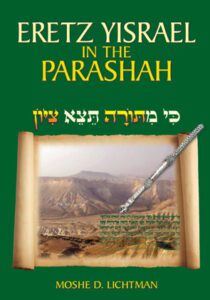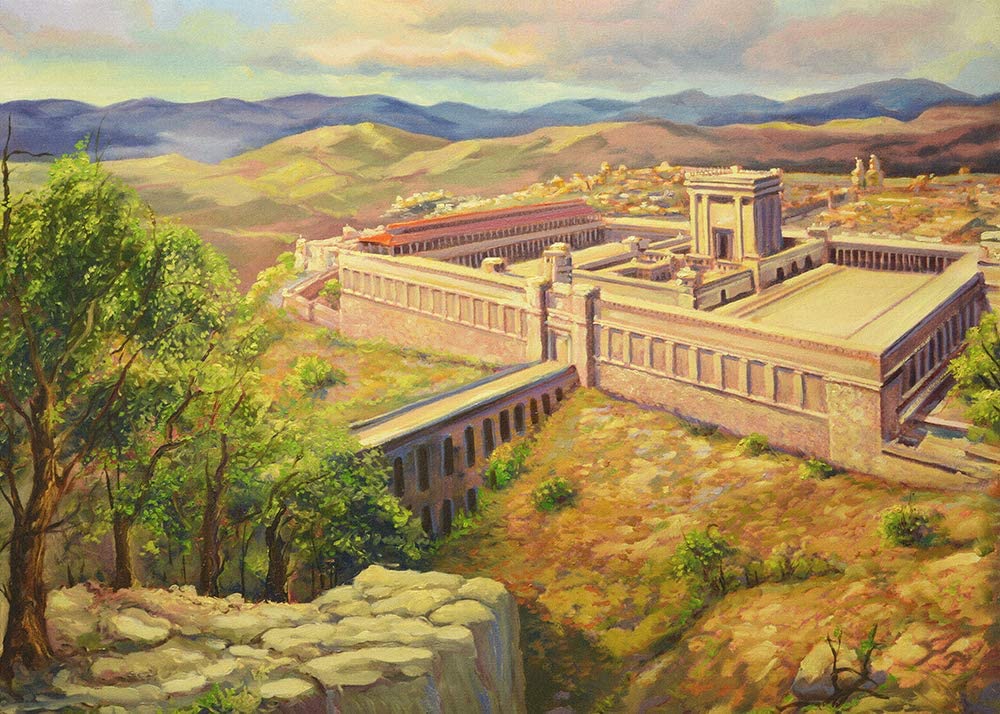Why Sacrifice?
Rabbu Moshe D. Lichtman

[For more writings and books of Rabbi Lichtman, see https://toratzion.com/]
WHY SACRIFICE?
This week’s parashah expands upon the laws of the sacrifices (korbanot). Sixteen of its eighteen mitzvot apply only in the Beit HaMikdash in Jerusalem (may it be rebuilt speedily in our days). This, then, is a good opportunity to discuss the purpose of korbanot.
When Tzav does not fall out on Shabbat HaGadol, its Haftarah is taken from the Book of Yirmiyah (7:21-8:3, 9:22-23). The beginning of the Haftarah reads: For I [God] did not speak with your fathers, nor command them, on the day I took them out of the land of Egypt, concerning burnt-offerings or sacrifices. Rather, only this thing I commanded them, saying, “Hearken to My voice, and I will be your God, and you will be My people…” These verses seem to contradict most of Sefer VaYikra, which is full of godly commandments concerning sacrifices. Many, if not all, of the commentators deal with this problem (see Nechamah Leibowitz’s Studies in VaYikra, vol. 4, pp. 1-15). Allow me to quote a beautiful explanation found in Oznayim LaTorah, by R. Zalman Sorotzkin. He answers the contradiction by comparing God to a physician. No matter how good-hearted and well-respected the doctor is, he anxiously awaits people to fall ill, for his entire livelihood depends on this. R. Sorotzkin continues:
Lest someone entertain the thought that God, as well, sits and waits (so to say) for man to sin and bring a sacrifice. Yirmiyahu comes to refute such a harmful way of thinking, by saying, For I [God] did not speak with your fathers, nor command them… concerning burnt-offerings or sacrifices. Rather, only this thing I commanded them, saying, “Hearken to My voice…” That is to say, I do not want you to rebel against My word, neglect a positive commandment, and bring a wholly-burnt offering (Olah), or transgress a negative commandment and bring a sin offering (Chatat)… I do not want you to become spiritually ill and come to Me to be cured, so that I can eat bull meat and drink goat blood. God forbid to even think such things! Rather, only this thing I commanded them, saying, “Hearken to My voice, and I will be your God.” I am happy to be your “spiritual doctor” even if you do not “fall ill” and have no need for cures (sacrifices). For I do not make My living through healing…, and I have no desire for sacrifices that come as a result of sin… Furthermore, God did not even command us [to bring] free-will offerings. He simply said, If a man among you brings an offering to the Lord (1:2). [That is], if a man, of his own volition, rouses himself to bring a sacrifice to express his thanks to HaShem, he must offer it in [a specific] way, and then HaShem will accept it graciously. And if a man sins, he can be cured with a Chatat or an Asham. And even communal offerings, such as daily and additional (Musaf) sacrifices…, come to atone for the Jews, for everyone sins at some point, especially the community as a whole…
According to this, God did command us about sacrifices. However, korbanot are not an ends in and of themselves, rather, a means by which to improve our relationship with HaShem.
This connects to something else in the parashah. One of the sacrifices mentioned in Parashat Tzav is the korban Todah (Thanksgiving offering), brought after a person escapes one of four dangerous situations. Chazal state that all sacrifices will be annulled in the future, except for the Todah (VaYikra Rabbah 9:7). This and similar statements are mistakenly interpreted to mean that the sacrificial rites will not be reinstated when Mashiach arrives. First of all, it is unclear what Chazal mean when they say, “in the future.” Which era is being referred to? The Messianic era? The Afterlife? Olam HaBa? Secondly, the Rambam states unequivocally that Mashiach will reinstate sacrifices (Hilchot Melachim 11:1). Thirdly, our prayers – especially the Holiday Musaf service – are filled with pleas to HaShem to return us to Zion so that we can offer Him sacrifices once again. Finally, the Yefei To’ar explains the above-cited Midrash to mean that all sin offerings will be annulled, because Jews will no longer sin. Communal, voluntary, and thanksgiving offerings, however, will still be brought, because we will always have reasons to thank HaShem.
This coming Pesach, let us pray extra hard for the rebuilding of the Beit HaMikdash, so that we may offer sacrifices to HaShem, to atone for all our sins, draw closer to Him (as the word korban – from the root karav [draw close to] – intimates), and most importantly, to thank HaShem for all the miracles – large and small, hidden and revealed – that He constantly does for us, every day and in every generation.
ADDITIONAL REFERENCES
Ø The Lord spoke to Moshe, saying: Command Aharon and his sons, saying: This is the law of the wholly-burnt offering… (6:1-6).
- Chayim Ben-Attar, the holy author of Or HaChayim, interprets these verses allegorically, as an allusion to our present exile and the final redemption. The following are excerpts from his fascinating commentary (as they appear in R. Eliyahu Monk’s translation, with minor changes):
On a moral-ethical plane, we may consider this whole paragraph as an allusion to our present and final exile. The paragraph is designed to console us about the depressing conditions we find ourselves in. Inasmuch as the soul of every Israelite refuses to be comforted, seeing [that] our exile appears to be interminable, we are certainly in need of some comfort. At the time of this writing [1742], the exile has already lasted far longer than our previous exiles combined (Egypt=400 years, Babylonia=70 years, whereas already 1,672 years have passed since the destruction of the Temple). How much longer do we have to wait for redemption?! Besides, we do not only suffer from mere exile, but from persecution…
The Torah, i.e. God, Who has foreseen all things, used this paragraph to inform Moses to urge the Israelites, and foremost amongst them the Torah scholars, notably the priests whose task it is to instruct the people in morality and ethics, to inform the people for all future times of the message contained here.
זאת תורת העולה, the word זאת is an exclusion. The people are to be aware that there will not be any ascent (עליה) comparable to the one mentioned in this paragraph. The Torah repeats who it is that will experience this ascent, i.e. הוא העולה, a reference to Song of Songs 3,6: מי זאת עולה מן המדבר, “Who is this that ascends from the desert?” על מוקדה על המזבח, “the ones who were burned up on the site for burning, on the altar.” The Torah refers to two details here: 1) that we are knowledgeable in Torah, i.e. זאת תורת העולה, something that does not exist amongst the Gentiles; 2) that we have endured many afflictions both by being in exile and by being impoverished. The word מוקדה is a reference to Torah, seeing [that] Torah is often compared to fire… When the [verse] continues על המזבח, this is a reference to exile and all that is connected with it. The afflictions the Jewish people suffer in exile achieve for us what the sacrifices achieved on the altar, i.e. atonement for our sins…
The Torah therefore informs us here that there are two elements which will ensure our ascent to untold heights of good fortune, honor, etc. The Torah also explains how long it will be until we achieve this goal. We will achieve our goal in two stages: 1) כל הלילה, by means of enduring the whole night of exile… 2) עד הבקר, when morning arrives, God will pour over us His glory, etc. This time will arrive after the middle of the sixth millennium, as we know from God’s own words that 1,000 years are equivalent to a “day” in His calendar… Reason tells us that the first 500 years of that “day” are part of the “night,” so that the time of the redemption will occur during the second 500 years of that millennium…
ואש המזבח תוקד בו, and the fire of the altar shall be kept burning thereby. The Torah informs us that when the dawn of that morning (of redemption) finally looms, God’s anger will burn and consume all those who have tortured us during the many years of our exile, especially the Western nations…
ולבש הכהן מדו בד, and the priest will wear a linen garment. The Torah switches to allude to the attribute of Love and Mercy, which has also been described by the word כהן. The Torah means that when that time arrives, even such attributes as Love and Mercy will consent to God avenging the wrong done to the Jewish people by the nations of the world…
If you will examine the matter you will find that the persecution we have suffered during this exile is much worse than what we experienced during our slavery in Egypt. When the Jewish people were enslaved in Egypt, the Egyptians fed and clothed them… Hail to the people who never had to experience exile under the (Arabs) Muslims. Not only did they enslave us and torture us, they did not pay wages for labor performed, but they demanded that we hand over what little we owned. People would be kidnapped to obtain their freedom by ransom. The Muslims would demand that people give them what they did not even possess and persecuted them to the point of death. The Torah alludes to this kind of persecution when it writes, והרים את הדשן אשר תאכל האש, God will elevate the ashes. When the nations of the universe experience troubles, they are compared to fire by our prophets. The Torah predicts that God will consume these nations as if by fire…
ופשט את בגדיו, and He will put off His garments. I.e., seeing [that] God wore a certain set of “garments” when He was engaged in disciplining our enemies, He will now put on different “garments” in order to do good with us, to take us out of exile. He will not delay the arrival of the redemption to occur on the date set for it originally until all the evildoers have perished. [Rather], he will gather us all in immediately and lead us to מקום טהור, a pure place. This is a reference to the Land of Israel which is always perceived of as a pure place compared to the lands owned by the Gentiles. Our Sages in Shabbat 15 have decreed that not only the soil of foreign lands is treated as infected with ritual impurity, but also the very air of lands outside Eretz Yisrael…






